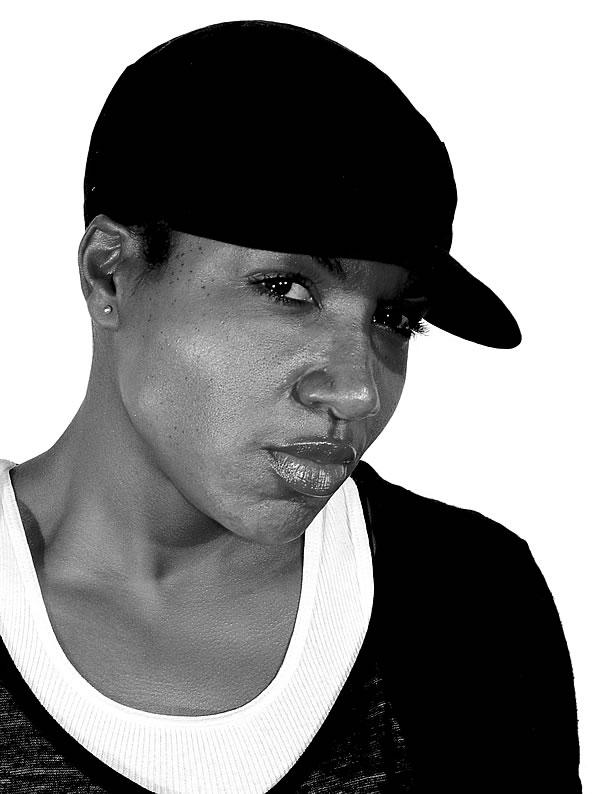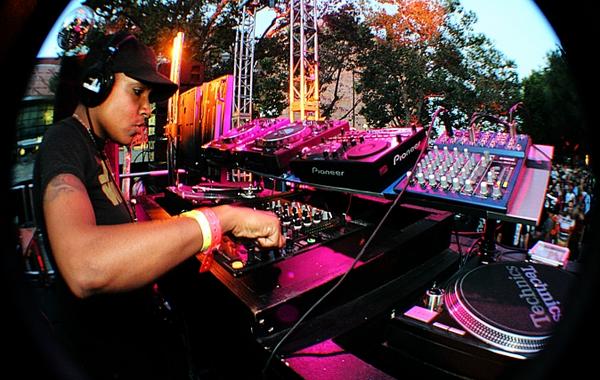
There are some people that can multi-task and there are others that are focused on one task at a time. The music business can be cruel and unforgiving but also very rewarding. The highs and lows of being in the industry can often take its toll as a musician, songwriter, singer, artist and a parent. Yes, a parent. At times, many of us can complain about the challenges of finding a supportive partner in life but what about juggling the responsibility of parenthood while pursuing your dreams?
DJ Heather is not only one of the most familiar names in the House music community but she has an international following. She has moved audiences from Chicago to Toronto; across the ocean in Paris, Italy, Germany and other countries. Besides wearing the crown as one of the reigning queens on the House DJ international circuit, she is a devoted wife and mom.
During one of her down days, we had a chance to chat with Heather about how she adjusted to parenthood along with maintaining her career as a traveling DJ and producer.
CD: How do you juggle the roles of mom, wife and working DJ?
DJH: It’s kind of trial by error. Any cliches that you want to throw in there are applicable. There’s no concept and you have to wing it to see if it works for you. I’m in a position to have time during the week so I’m able to spend quality time with my child. Going where I can to support the household in a different kind of scenario. I do everything related to Truman as it relates to his school and then my Mom is here to help, once or twice a week. My husband takes over if I’m gone for the weekend. We’re still two parents for a one-child household. We work it out where it makes sense so I try not to travel two or three weekends in row. I don’t want to be gone too often so I prefer not to put that pressure on my husband after he’s worked all week. It’s all about the scheduling.
You have a child and you become secondary- your desires and everything else is secondary. You just do it and if you can’t do it- you just can’t make it happen because you have a bigger responsibility.
CD: How did you start out as a DJ? What inspired you?
DJH: I‘ve always been a music person since I was little girl. What inspired me was when I was working in a restaurant and would put together these mixes on cassette tapes–putting together music that I liked. One day, this guy came in and worked for a record label, he asked me to come by a bar to try djing. From there, it was about programming and sharing what I liked. Eventually, it grew into the technical aspect because I watched other DJs do their thing whether it was techno, hip hop or house music. First and foremost getting into djing was purely for sharing music that I really like.
CD: Who were some mentors in the business that helped guide you earlier in your career?
I wouldn’t say mentors. I just had people who supported me. I didn’t say, ‘Hey, mentor me or can I kick it with you?’. I was in that club environment, whether I was going to loft or underground parties. I was watching a lot of people and working in club. When I was a bar-back at the Red Dog, I would hear all of these people play- Lego, Diz and Johnny Fiasco. I think by default those were kind of my mentors. I was not really in their House world. I was known as a hip hop DJ when I first started. I was playing at the Artful Dodger and then moving on to different clubs in the city. Being a DJ and being a Black female DJ was a good thing.

CD: You were one of the first female Chicago Hip Hop DJs, when did you transition into doing more House and Dance music?
Again, being a Chicago kid I was always buying and listening to House music. In high school, I was asked if I was ‘House’ because I was always wearing vintage clothes. I went to the parties at the Bismarck Hotel but my hands was always in hip hop too. That’s what I was known as spinning. I was playing a couple of underground parties and people started booking me for the House parties because there weren’t a lot of DJs playing House the way I was playing it.
CD: What was the turning point for you?
DJH: I remember one of the last hip hop events that I played which was the LL Cool J album release party at the Crobar. It was a few hours later that I went to see Derrick Carter and some friends play at a House party. That was an ‘aha’ moment, the energy was different. It changed within hours and I began to think I was moving away from one genre to another.
CD: Tell us about the Super Jane DJs. How did idea of putting together a female House group begin?
DJH: Colette and Dayhota were always playing especially Colette who was emceeing and hosting. We came up with the idea of mirroring what the guys were doing, which was putting their friends on and throwing parties. That’s how the idea came about- we just wanted to showcase our friends which happened to be female DJs. We didn’t feel there was a voice or a platform for female DJs so we put something together. In the beginning, we did small events at Redno5 and then at the Buddha Lounge and Karma- places like that. Some nights, it would be us or guests from out of town. It was a collective spirit, sometimes Lady D would join us.
CD: How did you continue to brand yourself as a DJ and producer?
Super Jane was a place that was great that ran parallel to everything that I had done. Which marks 17 years ago this year. That was part of the DJ cycle that I felt was a partial launching point but I don’t think that it was a full representation of Colette, Dayhota, Lady D or myself.
We’re very different people, very different artists but speaking for myself I feel that it’s been great. For a lot of people it was a starting point for female DJs in terms of how they became familiar with us which peaked their interest.
CD: What are some of the differences that you see now than when you began?
DJH: I really wish a lot of people that are getting into it now have the introduction with a tactual experience; beat matching two records or two different styles where you’re literally using your hands. You’re beat matching, you’re not doing it by watching waveform. You’re spinning by ear and by key. I think a lot of kids are missing that experience. Discipline has to apply.
Follow DJ Heather on twitter: @djheather
Follow Mary L. Datcher on twitter: @globalmixx